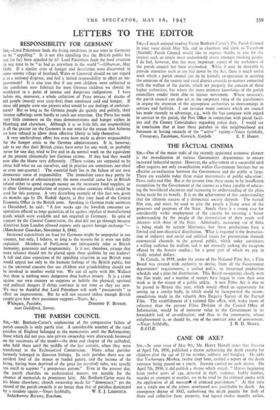THE FACTUAL CINEMA
Snt,—One of the major tasks of the recently appointed economic planner is the co-ordination of various Government departments to ensure increased industrial output. However, the achievement of a successful total effort requires not only co-ordination within Government Services but an effective co-ordination between the Government and the public at large. There are available today three major instruments of public education: Press, radio and film. But at the present time there seems to be insufficient recognition by the Government of the cinema as a force capable of educat- ing the bewildered electorate and increasing its understanding of the plans being made for its benefit. It is on the achievement of this understanding that the ultimate success of a democratic society depends The factual film can, and must, be used to give the people a living sense of the processes and purposes of the State. Surely there is a strong case for considerably wider employment of the cinema for ensuring a better understanding by the people of the interrelation of their needs and interests with those of the State. Admittedly, increasing use of films is being made by certain Ministries, but these productions have a limited and non-theatrical distribution. What is required is the dramatisa- tion of industry and social and political issues for presentation through commercial channels to the general public, which today constitutes a willing audience for realism, and is not eternally seeking the escapism offered by the feature studios ; for a great part of which we pay in vitally needed dollars.
In Canada, in 1939, under the terms of the National Film Act, a Film Board was created with authority to devise, from all the Government departments' requirements, a unified policy, an integrated production schedule and a plan for distribution. This Board co-operates closely with the film trade, and a number of renters have begun to view their own work as in the nature of a public utility. A new Films Act is due to be passed in Britain this year, which would afford an opportunity for setting up a similar body, in which could be incorporated the recom- mendations made in the valuable Arts Enquiry Survey of the Factual Film. The establishment of a national film office, with wider terms of reference than the present Films Division of the Central Office of Information, would be of immense value to the Government in its formidable task of co-ordination, and thus to the community, whose enlightenment is, or should be, one of the constant aims of government.


































 Previous page
Previous page